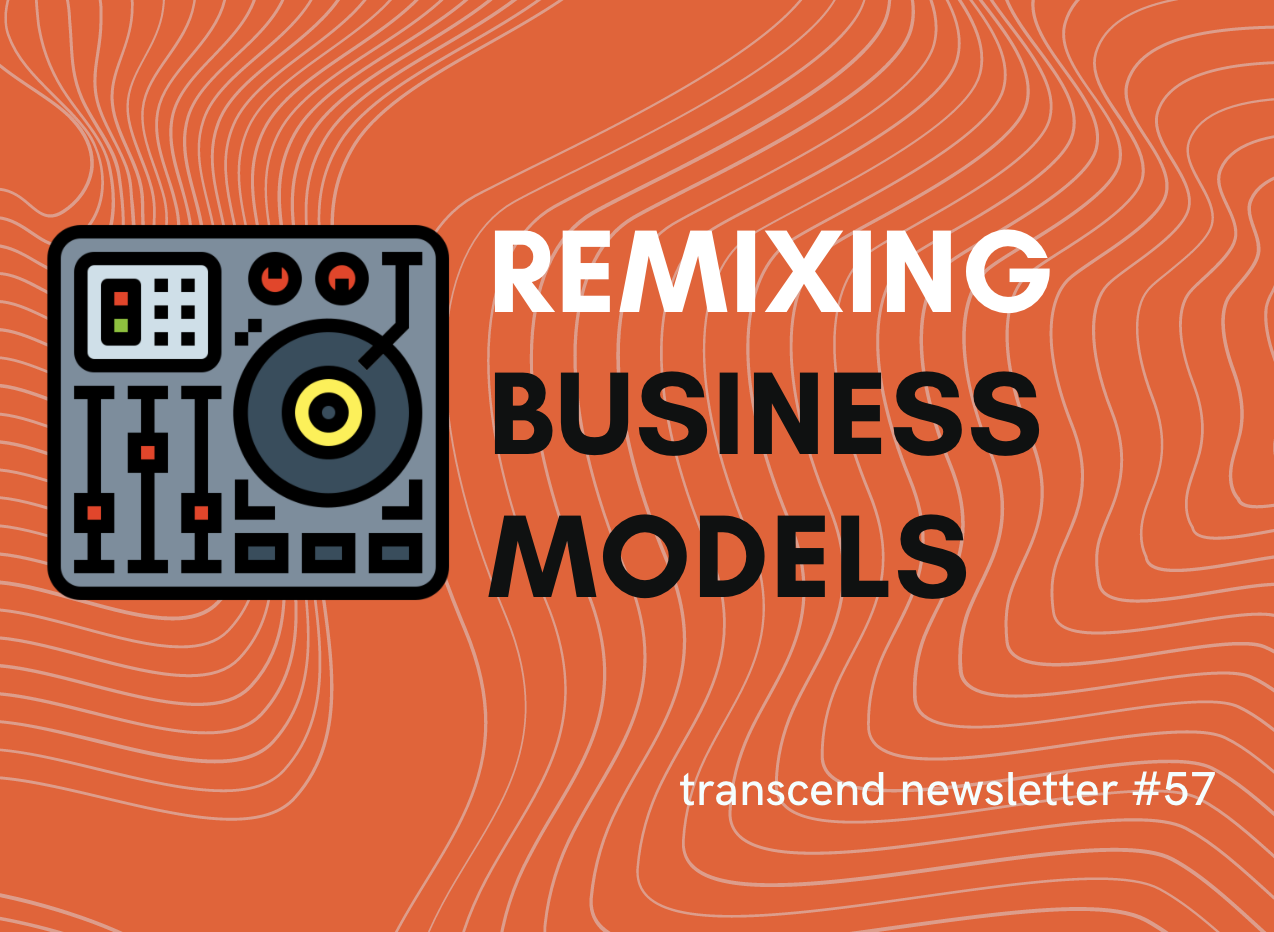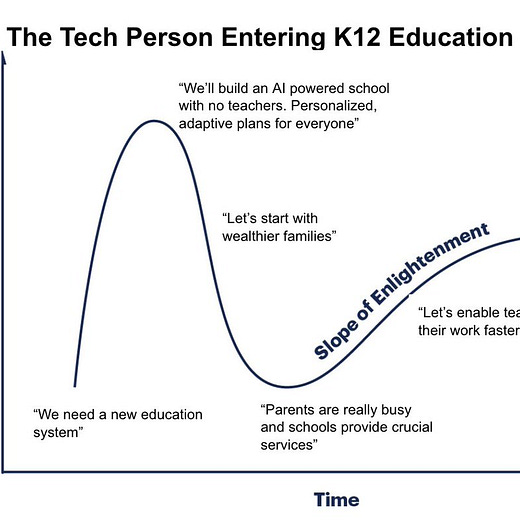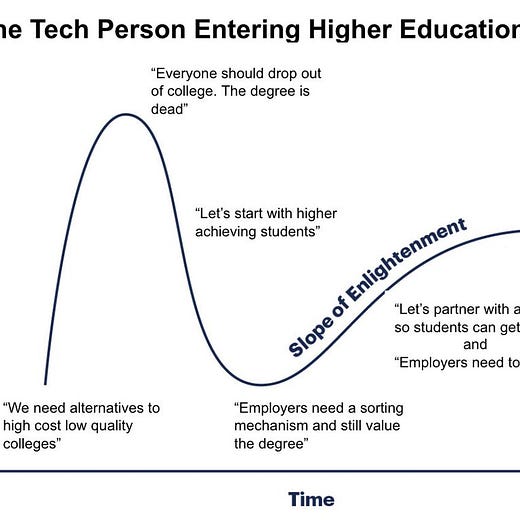Remixing Business Models 🎹 Transcend Newsletter #57
How the greatest edtech organizations remix proven models to expand their impact
Hola! Alberto here, writing from Madrid. Welcome to the Transcend Newsletter 👋
The Transcend Newsletter explores the intersection of the future of education and the future work, and the founders building it around the world.
We welcome 37 new readers to the newsletter since our last post. If you love reading about the future of education and work, hit the ❤️ button and share it with your friends!
Before we go into this week’s newsletter, I wanted to remind you about our Exploration Bootcamp🧭, a program to help individuals validate their startup ideas and find their first users. We’ve built the program in partnership with John Danner to bring his frameworks to awesome aspiring founders out there.
You should apply before Friday + reply to this email if you have any questions about the program ❤️
Check out our launch on Twitter👇
Remixing (Edtech) Business Models
Over the last decade, we’ve seen the spectacular rise and fall of new business models in education like ISAs, learn-to-earn, and many more.
The grandiose promise of new ways to align incentives in education was so promising! But most of these models have failed miserably. By the time these innovative ideas matured in the market, things usually look pretty different: all the glamour would be gone and give way to an LMS-style B2B corporate learning tool. Nothing wrong with building a solid, boring business… but it’s just not as exciting.
What went wrong? The answer is simple: there have always been very few business models for edtech. If you look at unicorns in the space, there are very few ways to make money in education at scale:
Schools and students pay for textbooks/educational content (e.g. education publishers like Pearson, HMH, Scholastic, Wiley, McGraw Hill)
Revenue-generators for school (OPMs like 2U, or university recruitment like Applyboard)
Parents pay to get better grades (tutoring companies like GoStudent, VIPkid or VarsityTutors, student service startups like Chegg)
Governments who subsidize upskilling through direct training (Coursera For Governments, OpenClassrooms)
Companies that pay for corporate training (GO1, Udemy + Coursera for Business, Degreed) usually incentivized by governments
A couple other ones exist, like tools for the operations of schools, student finances, or consumer learning platforms… but they tend to have only one or two big players. The bottom line is there are really few business models out there for edtech startups to innovate! Even the flashiest edtech companies like Coursera or Udemy end up pivoting into one of these business models eventually.
ROI and Education
In my view, the fundamental feature of education that creates this scenario is that education and training are investments that take decades to yield an ROI. And they are hard to measure too!
So it’s not crystal clear to governments and employers that they should go out of their way to double their learning and training budgets. Investing in education does not show results in the short term for many of the entities that are supposed to pay for it – as a result, only few of them have the financial muscle or vision to invest in education at scale:
Governments who can subsidize education/training (they can think long term and have the resources to do this).
Companies that can gain a competitive advantage through better training (they can increase employee retention or save costs).
Families who can spend to invest in a better future for their kids (they can invest in their growth through education).
If this is the case, why would anyone invest in early-stage edtech startups?
Well, we invest because we believe this will change in the future. But leaving my idealism aside, I think this change is already here. It’s just not disrupted for now– it’s remixed!
Remixing Business Models
The greatest edtech companies out there don't generate new business models in edtech.
They remix them.
Remixing business models implies understanding the narrow set of budgets that edtech startups can pull from, but finding creative ways to use them! In practice, this means involving new stakeholders in the mix, and doing so in a way that satisfies the funders of education and the recipients of it. Here are some examples of remixed spaces:
Remixing Government Training 🎓
The old business model: Govt Contractors – governments invest in training directly through a number of agencies, and providers fight to become a contractor for the government to provide those services. They control the overall experience
The remixed model: pay-for-effectiveness – a new wave of startups is taking advantage of these budgets, but ensuring that the programs accomplish their goals more effectively, by creating a marketplace for employers to access upskilling funding (Multiverse), offering new digital skills training (OpenClassrooms) or even wrap-around services (ShiftUp).
Remixing Corporate Training Budgets 🏢
The old business model: corporates invest in productive assets on their own (talent acquisition, retention or marketing) that directly impact their bottomline.
The remixed model: work-integrated training that blends employment and learning (like Guild Education) or showcases the key skills at the company with a wide audience of candidates (like Patika, Clicked or Forage)
Remixing Hiring 💼
The old business model: the placement fee has been the standard for hiring businesses, but it’s neither recurring nor continuous after employment (leaves no incentive to continue training the employee).
The remixed model: train-to-hire, focusing on supporting the candidate to land a job or upskill through a learning experience until they can find a job eventually (take2)
This framework has brought clarity to the way we guide founders at the early stages: founders need to understand the ecosystem of existing buyers in edtech, but feel creative with how they are used and who they serve with these budgets!
If you are remixing a traditional business model in education or the future of work, hit reply and say hello – we want to hear from you!
The Roundup ☀️
🧭 Exploration Bootcamp applications close on Aug 19. Learn more here
🌍 7 investors discuss why edtech startups must go back to basics to survive: Read more
🏢 ‘A New Strategy For Corporate Learning: Growth In The Flow Of Work’: Joshn Bersin
Network Jobs 👩💻
Looking for your next opportunity in the edtech + future of work space? Check out our **Transcend Network Pallet** to find the best job opportunities from our network:
Co-founder @ Writer’s Desk (US - Remote)







Hi there from a remixing biz model scale-up from Spain: Odilo 🤟 Very insightful post for industry newcomers!
🔥